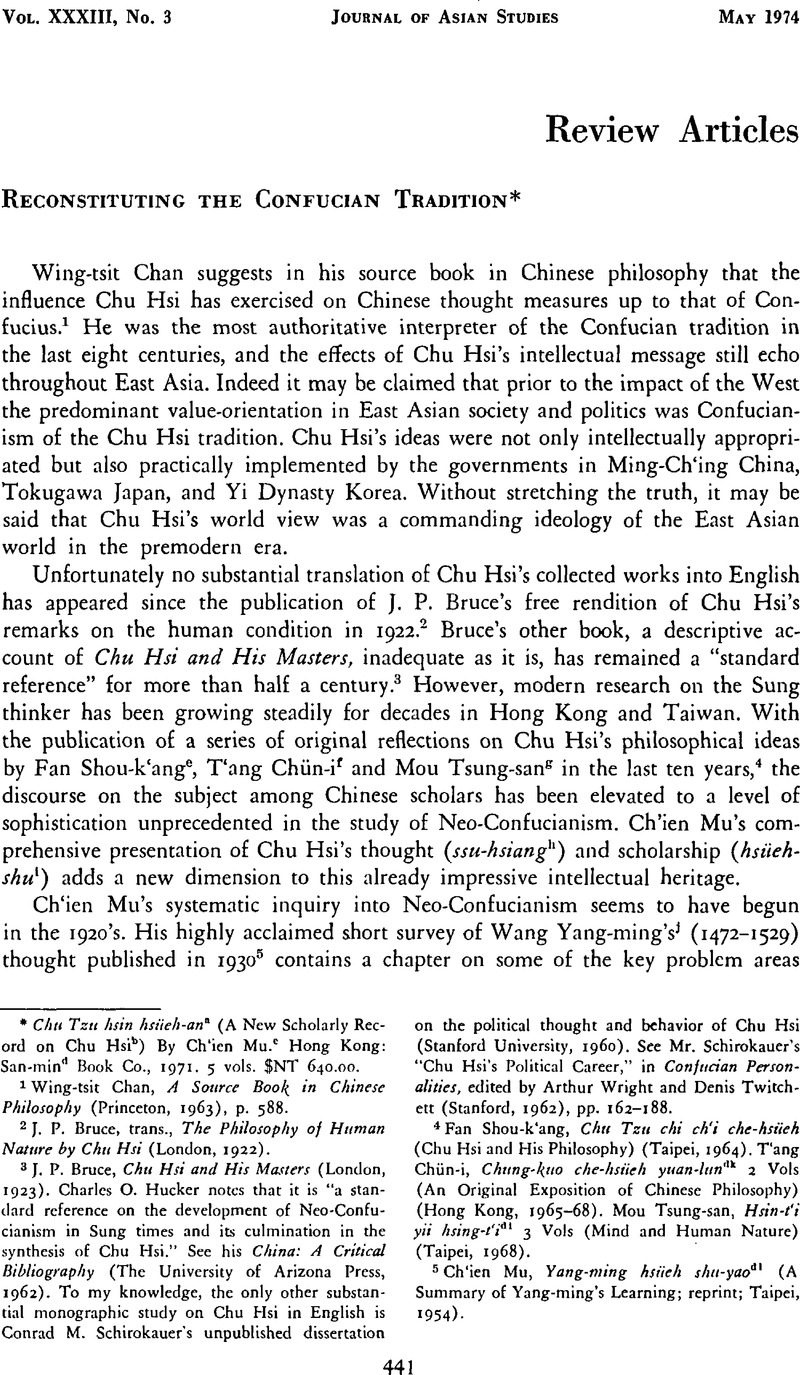Published online by Cambridge University Press: 23 March 2011

1 Chan, Wing-tsit, A Source Book in Chinese Philosophy (Princeton, 1963), p. 588.Google Scholar
2 Bruce, J. P., trans., The Philosophy of Human Nature by Chu Hsi (London, 1922).Google Scholar
3 Bruce, J. P., Chu Hsi and His Masters (London, 1923).Google Scholar Charles O. Hucker notes that it is “a standard reference on the development of Neo-Confucianism in Sung times and its culmination in the synthesis of Chu Hsi.” See his China: A Critical Bibliography (The University of Arizona Press, 1962).Google Scholar To my knowledge, the only other substantial monographic study on Chu Hsi in English is Conrad M. Schirokauer's unpublished dissertation on the political thought and behavior of Chu Hsi (Stanford University, i960). See Schirokauer's, Mr. “Chu Hsi's Political Career,” in Confucian Personalities, edited by Arthur Wright and Denis Twitchett (Stanford, 1962), pp. 162–188.Google Scholar
4 Fan Shou-k'ang, Chu Tzu ch'i ch'i che-hsüeh (Chu Hsi and His Philosophy) (Taipei, 1964). T‘ang Chün-i, Chung-kuo che-hsiieh yuan-lundk 2 Vols (An Original Exposition of Chinese Philosophy) (Hong Kong, 1965–68). Mou Tsung-san, Hsin-t'iyii hsing-t'id1 3 Vols (Mind and Human Nature) (Taipei, 1968).
5 Ch‘ien Mu, Yang-ming hsüeh shu-yaod1 (A Summary of Yang-ming's Learning; reprint; Taipei, 1954).
6 Bary, Wm. T. de, comp., Sources of Chinese Tradition (New York, 1960), pp. 585–586.Google Scholar
7 Liu, James T. C., “;How Did a Neo-Confucian PPSchool Become the State Orthodoxy?” in Philosophy East and West XXIII, No. 4 (October 1973). PP 483–505.Google Scholar
8 Ying-shih, Yü, “Ts'ung Sung-Ming jn-hsüeh ti ja-chan lun Ch'ing-tai ssu-hsiang shihim” (“Ch'ing Thought as Seen Through the Development of Sung-Ming Confucianism,”) in Chung-kuo hsüehjendn (chinese Scholar) 2 (September 1970), pp.19–41. This is the first part of a two-part article. The subtitle is “Sung-Ming ju-hsüeh chung chihshih chu-i ti ch'uan-t'ungdo” (“The Tradition of Intellectualism in Sung-Ming Confucianism.”)Google Scholar
9 Wang Mou-hung, Chu Tzu nien-p'u k'ao-idp (A Critical Examination of Chu Hsi's Chronological Biography) (Ts'ung-shu cfi-ch'engddq edition, 1937), pp. 263–268.
10 Wing-tsit Chan, p. 589.